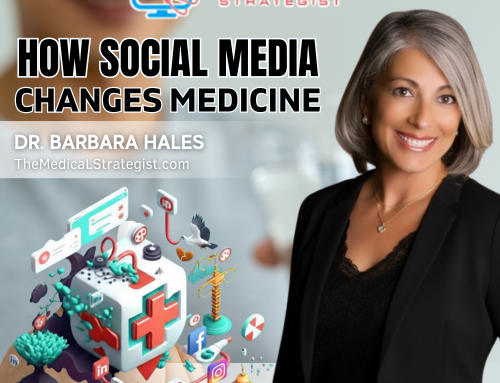Podcast: Play in new window | Download
Subscribe: RSS
In this episode, Dr. Barbara Hales and James Bond discuss:
• How powerful brand names and slogans can stick in people’s minds
• The importance of emotional selling using metaphors, alliteration, and rhyme
• How well-crafted slogans like “No More Tears” and catchy names like “Squatty Potty” can drive massive success
Key Takeaways:
“It’s not just logic that sells—it’s emotion that makes things stick.” – James Bond
Connect with James Bond:
Website: www.BrainGlueBook.com
LinkedIn: James Bond on LinkedIn
Connect with Barbara Hales:
Twitter: @DrBarbaraHales
Facebook: facebook.com/theMedicalStrategist
Business website: www.TheMedicalStrategist.com
Show website: www.MarketingTipsForDoctors.com
Email: info@TheMedicalStrategist.com
YouTube: TheMedicalStrategist
LinkedIn: www.linkedin.com/in/barbarahales
Books:
Content Copy Made Easy
14 Tactics to Triple Sales
Power to the Patient: The Medical Strategist
TRANSCRIPTION (169)
Introduction: The Power of Emotional Selling
Dr. Barbara Hales: Welcome to another episode of Marketing Tips for Doctors.
I’m your host, Dr. Barbara Hales, and today we have with us James Bond, one of America’s leading behavioral management specialists and author of the award-winning book Brain Glue. This book is blowing people’s minds and changing how they sell their ideas, products, and businesses. For 13 years, James ran one of Southern California’s leading behavioral management firms and has worked with a ‘who’s who’ of American business. Early in his career, he ran an advertising agency in Montreal. Welcome to the show, James.
James Bond: Hi Barbara, thank you for having me. Your show is awesome, and I’m just privileged to be here.
Branding and Memory: The Impact of a Name
Dr. Barbara Hales: You must get this all the time, but how does it feel to have the name James Bond?
James Bond: (laughs) Well, my parents had a sense of humor. I was born after the books and before the movies, so it wasn’t until the movies came out that people started noticing. But yes, it sticks—just like Brain Glue! I find it fascinating how certain names, like James Bond, are easy to remember, and how powerful that can be in branding. People don’t forget my name, and that ties into what I talk about in Brain Glue—how certain names and slogans just stick in people’s minds.
The Importance of Memorable Brand Names and Slogans
James Bond: When you’re selling a product, an idea, or even yourself, having a name that sticks is crucial. Think of the slogan “Blue Emu: It works fast, and you won’t stink.” When you hear that, your brain latches on, and you remember it. It’s not just about having a good product; it’s about making people notice and remember it.
Why Certain Words Stick in the Brain
Dr. Barbara Hales: So, what is it about certain words or phrases that make them so sticky?
James Bond: Great question! Words like “dirty” can have a strange power. Think of Dirty Dancing or Dirty Harry. The word itself grabs attention. Or take something like The Vagina Monologues—it’s unexpected, and it makes you curious. That’s part of why it works. Using the right words can wake up the brain and get people to take notice.
Using Emotional Triggers in Marketing
James Bond: In Brain Glue, I explain how tools like alliteration, rhyme, and metaphors activate the brain and make messages memorable. For example, Johnson’s Baby Shampoo’s slogan “No More Tears” is brilliant. It directly connects with parents’ emotions and creates a bond with the product. Similarly, the Morton Salt slogan “When it rains, it pours” is another example of a simple, powerful message that sticks.
Why Rhyme is a Powerful Tool
Dr. Barbara Hales: You mention rhyme as one of the key elements. Why is rhyme so powerful?
James Bond: Rhyme is incredibly powerful because it’s easy for the brain to retain. Think about “Jack and Jill went up the hill.” You probably learned it as a child, but you still remember it. Rhyme helps phrases stick in our minds long after we hear them, and this tool is often used in marketing. Remember, “If the glove doesn’t fit, you must acquit”? That stuck with the jury during the O.J. Simpson trial, and it’s a perfect example of how rhyme can drive a message home.
Metaphors and Analogies in Branding
James Bond: Another powerful tool is the use of metaphors or analogies. For example, John Gray originally wrote a book called Men, Women, and Relationships, but it wasn’t selling well. One day, during a seminar, a woman said, “It’s like men are from a different planet!” And that’s when it clicked—Men Are from Mars, Women Are from Venus was born, and the book became a bestseller. The metaphor made it relatable and easy to remember.
Case Study: The Success of Squatty Potty
James Bond: Let’s take the example of Squatty Potty. Originally, it was just a toilet stool. Not a very exciting name, right? But the creator thought, “What’s another word for toilet? Potty. And what are you doing? You’re squatting.” And so, the name Squatty Potty was born. It’s catchy, almost rhymes, and sales skyrocketed—over $100 million in a few years, all because of the power of a name.
The Psychology of Attention-Grabbing Phrases
James Bond: When creating a brand or slogan, you want to grab attention. For instance, Brain Glue sticks to the brain like glue. The key is to make sure your message stands out from the crowd. If you’re using rhyme or alliteration, your brain engages differently. That’s why brands like Coca-Cola, Best Buy, and PayPal are so memorable—they’re using repetition of sound to stick in people’s minds.
How Famous Figures Use These Tools
Dr. Barbara Hales: How have public figures like U.S. presidents or civil rights activists used these techniques?
James Bond: Great question! John F. Kennedy’s famous line, “Ask not what your country can do for you, ask what you can do for your country,” uses a technique called chiasmus—reversing the structure of a sentence. Malcolm X also used powerful metaphors, like “We didn’t land on Plymouth Rock; Plymouth Rock landed on us.” These tools resonate because they engage the brain in a memorable way.
Conclusion: Applying Emotional Tools to Marketing
Dr. Barbara Hales: So, what final tips can you give to our listeners about using Brain Glue in their own marketing efforts?
James Bond: Start by using metaphors and analogies to make your product or service relatable. Then, play with rhyme or alliteration to make it stick. You want to create an emotional trigger that makes people remember your message. And remember, as Zig Ziglar said, “Selling is nothing more than the transference of passion.” If you’re passionate, that emotion will connect with your audience.
Closing Remarks
Dr. Barbara Hales: James, thank you so much for sharing these insights today. I’m definitely running out to get your book!
James Bond: Thank you, Barbara! It’s been a pleasure to be here.
Dr. Barbara Hales: You’ve been listening to Marketing Tips for Doctors with your host, Dr. Barbara Hales, and James Bond, author of Brain Glue. Until next time!



